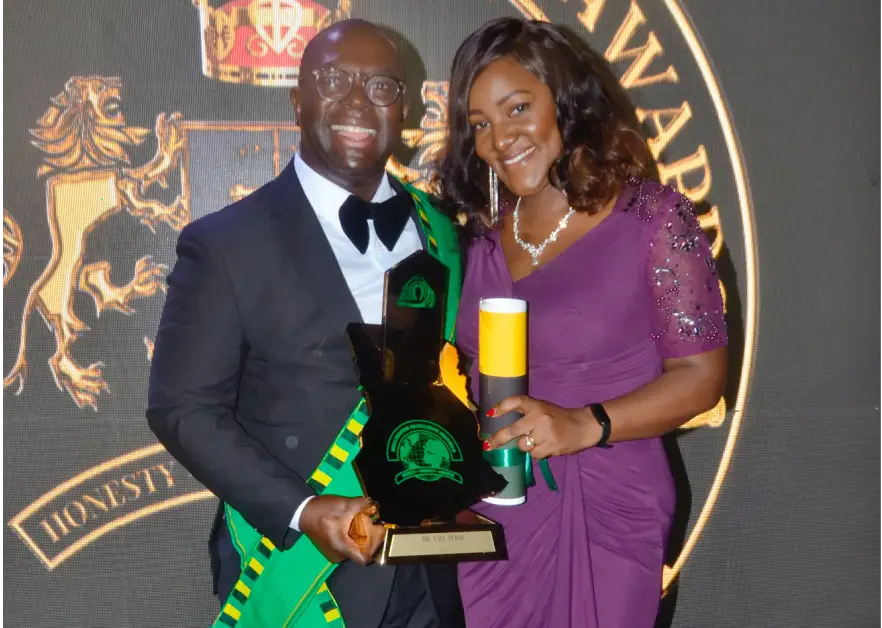
Why UTC and GMT are Quite the Same Yet Very Different
Why UTC and GMT are Quite the Same Yet Very Different
Here’s why most people today use UTC instead of GMT: Coordinated Universal Time (UTC) is preferred over Greenwich Mean Time (GMT) primarily because the former is a more precise, scientifically based standard that remains consistent year-round, whereas GMT is a time zone subject to seasonal changes. While they are often used interchangeably because they share the same base time (+0), UTC is the standard for modern, technology-driven, and global applications.
Here are five cogent reasons why UTC is preferred:
1. Superior Precision (Atomic vs. Solar Time): GMT is Solar-Based: Historically, GMT was based on the rotation of the Earth and the position of the sun at the Greenwich meridian. The reference to ‘Greenwich’ is because longitude 0° historically passed through the Royal Observatory in Greenwich, London established in 1884. (Technically the line is now 102 metres away.) Because the Earth’s rotation is not perfectly uniform (it slows down slightly), GMT lacks the microsecond precision required for modern technology.
UTC is Atomic-Based: UTC is calculated using atomic clocks, which are incredibly precise. This makes UTC essential for GPS, satellites, international telecommunications, and computer networks.
2. Consistency (No Daylight Saving Time); UTC never changes: UTC does not observe Daylight Saving Time (DST). It remains at +00:00 all year.
GMT shifts: In the UK, time shifts between GMT in the winter and British Summer Time (BST) in the summer. Using UTC avoids the confusion of switching between GMT and summer time.
3. Scientific and Global Standard Universal Reference: UTC is the international standard used to regulate clocks and time globally. It acts as the anchor for all other time zones (e.g., UTC+1, UTC-5), making it more neutral and universal than a time zone named after a specific location.
Aviation and Military: Known as “Zulu” time, UTC is the standard for aviation and military operations to avoid confusion across different time zones.
4. Technical Reliability Leap Seconds: To keep UTC aligned with the Earth’s slightly irregular rotation, leap seconds are added, allowing it to maintain the extreme precision of atomic time while remaining in sync with the sun’s position within one second.
5. Decolonization: Longitude 0° (Prime Meridian) passes through many wonderful places in the world, including Tema in Greater Accra, Ghana, not just a certain Greenwich, London in the United Kingdom. Giving such a globally central phenomenon a universal tag (UTC) is much more appropriate in our modern world.
In short: While GMT is still used in the UK and in casual contexts, UTC is preferred because it is scientifically precise, consistent, independent of political or regional time changes and is free of colonialism vibes.

Of Missions and Schools
A #DeepLeader lives with nuance, tames tensions and straddles paradoxes.
When people talk about ‘mission schools’ in Ghana they typically do not include my alma mater Achimota School. I guess it’s because Achimota wasn’t started or ran by a religious denomination. Yet as a public school co-founded by the then Gold Coast governor (Gordon Guggisberg), the famous African educationist Dr. Kwegyir Aggrey and a certain Reverend Fraser, the former ‘Prince of Wales College’ (founded in 1927) as the first truly co-ed secondary school–boys and girls mixed–has always had significant Christian missionary aims; not just missional overtures and undertones. Indeed the names of the residential houses are in honour of some (in)famous Western missionaries like David Livingstone and Mary Slessor.
Achimota has seven ideals upon which she was founded. It has fascinated me for years that the seventh ideal could not be more overtly evangelistic: “The belief, on which all else rests, in Jesus Christ as the revelation for all times and all peoples of the love of God, and as the guide and pattern of our lives.”
Part of the current discussion about faith and schools/faith in schools must take cognisance of the largely ‘Christian’ world and worldview of the planet at the time of the founding of schools like Achimota (late 19th and early 20th centuries) compared to the current milieu of secularisation, hyperhumanism and the push for space religions like Islam overtly seek in public arena, especially in the West.
Of all the religions, Christianity and Islam tend to clash the most because both are missionary in nature and claim the totality of human life (spirit, soul and soma) plus seek to influence every sector of the entire society. In light of this, respect for each other and open dialogue between both are key in any pluralistic context that seeks to be sane, safe and far from sedentary.
For those interested in all seven ideals upon which Achimota School is built, here they are:
1. The best use of the minds and bodies which God has given us.
2. An equal opportunity for boys and girls.
3. Respect for all that is true and of lasting value in the old African culture, beliefs and way of life
4. Willing, humble service of the educated for the uneducated.
5. Mutual understanding and cooperation between Christians of all denominations, and the growth of that spirit in which the churches shall one day be united again.
6. Friendship, respect, and cooperation among all races on equal terms.
7. The belief, on which all else rests, in Jesus Christ as the revelation for all times and all peoples of the love of God, and as the guide and pattern of our lives.
If given the opportunity to do it all over again, so-to-speak, I wouldn’t choose another school. Not for all the rice in China; or all the spare parts in Abossey Okai!
Is the publicly-founded and publicly-funded Achimota Secondary School a ‘mission school’ or not? Life and leadership are more nuanced than too many of us care to appreciate.
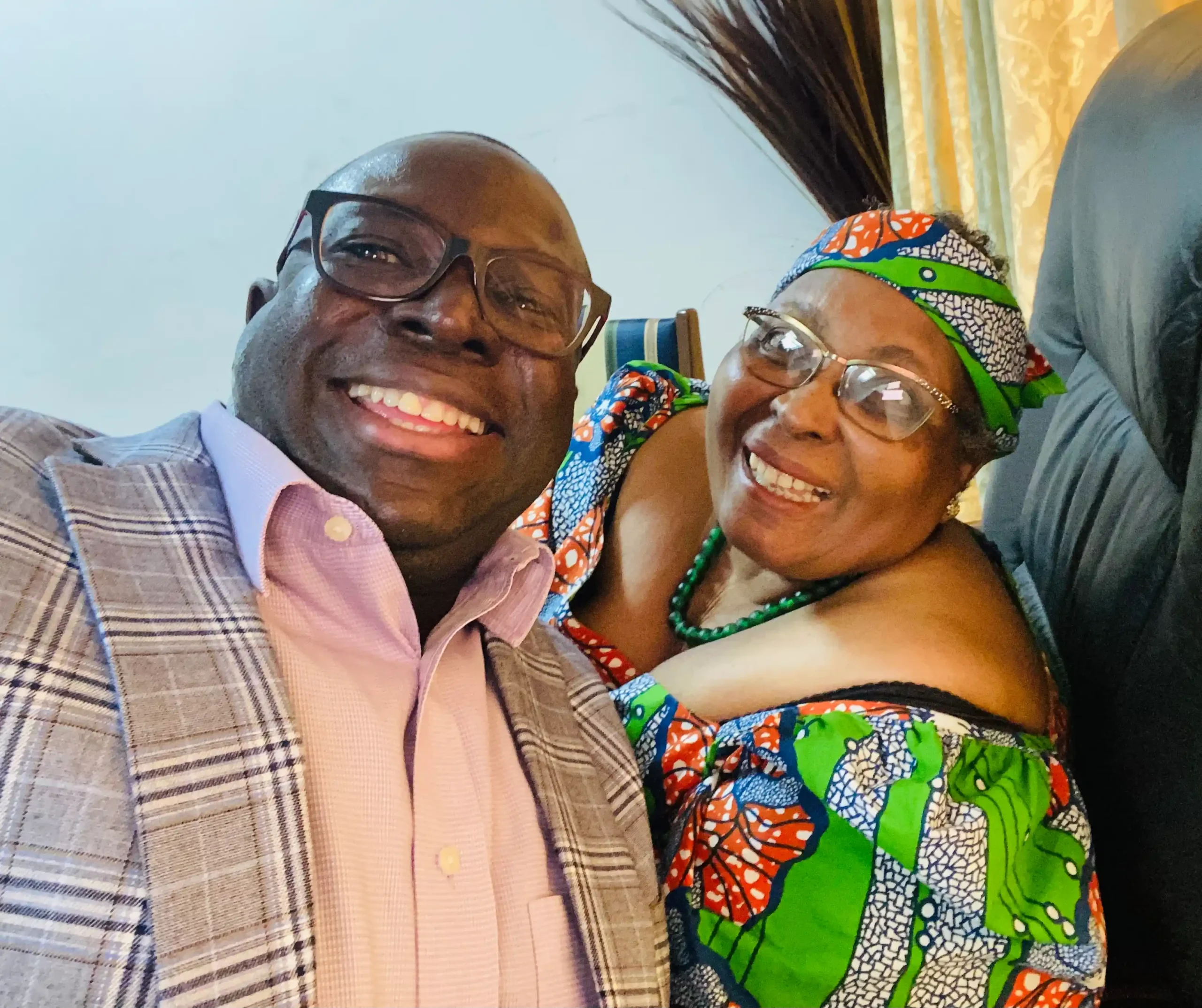
Afram: The Names Behind the Founding of an African Publishing Giant
That’s the current board chair of Afram Publications Ghana Ltd. To me, she’s just my ‘aunt’ of many years, ‘Auntie Esi.’ Her academic colleagues and students will recognize her as Prof. Esi Sutherland-Addy and the whole of the Republic of Ghana might recall her in all sorts of roles including Minister of State for Education and Culture.
What’s the connection? Well, it was her mother—eminent writer and cultural activist—the late Mrs. Efua T. Sutherland, who first envisioned in the 1950s creating an indigenous publishing house in Ghana.
My grandfather, the late Professor J. H. Kwabena Nketia, recalls that “Mrs. Sutherland discussed the idea with Professor K. A. Busia, Dr. J. B. Danquah, and several other prominent writers and scholars of the time. This vision gained further momentum nearly two decades later through the collaboration between Mrs. Sutherland, Mr. Willis E. Bell, an exceptionally talented photographer, and Professor J. H. Kwabena Nketia, a renowned musicologist and writer. Their collective focus was on publishing their creative works and other African and local materials for Ghanaian readers.” (Afram Publications website)
So that was the post-colonial trinity that founded Afram Publications: Efua Sutherland, Kwabena Nketia and Willis Bell; two gentlemen and a lady, two Africans and an American. While Mr. Bell brought his artistic skills and sharp business acumen to bear, Mrs. Sutherland and Prof. Nketia brought to the table their innovative ideas and academic weight as acclaimed educationists, writers, and Africanists.
WHY THE NAME ‘AFRAM’?
Before the construction of the hydroelectric Akosombo Dam in 1964-65, Dr. Kwame Nkrumah (Ghana’s first president) assembled a research team that included the founders of Afram Publications and several young graduates from the University of Ghana.
This team went to the #AframPlains to collect data on the people, places, and cultural practices of the area. The goal was to ensure that the history and cultural heritage of the region, which would be affected by the impending flooding by the damming, would not be lost to society.
Thus later naming their nascent company ‘Afram’, which was incorporated in 1973 and began operations in 1974 (a decade after the research tour), became a way to preserve and promulgate that people, place and their practices for posterity, in perpetuity. It is worth noting the spirit of patriotism here, for none of the Afram founders was from the Afram Plains.
Whatever happened to that spirit?!

The Blessing and Baffling of Buffett
Here is my AI friend’s idea of a Black philanthropist. It didn’t have to be male, or this old; and needn’t be in a suit. But otherwise, not bad.
What I love most is the joyous expression. Many people don’t know the kind of JOY it is to give; that it is way higher and much deeper than the kind of joy one gets when they receive.
And maybe it’s because somehow our subconscious knows “It is more blessed to give them to receive.” And those aren’t just nice motivational words from a Ziglar, Rohn or Les Brown; remember they are the words of the Lord Jesus himself (Acts 20:35).
Today, many people are grabbing the ephemeral things of this world like there’s no tomorrow or eternity. The reality is that you can’t go into eternity with your stuff; but you can send them ahead by your giving today.
Having said that, another mistake is to think our generosity guarantees us a good place on the other side of the river—when we die. Even the amazing investment guru Warren Buffett got it wrong. When asked why he was being so generous in pledging to donate the vast majority of his fortune to charity in 2006 (and asking several billionaires like Bill Gates to do same), humorously but mistakingly he said, “There is more than one way to get to heaven, but this is a great way.”
Jesus and Buffett agree that #generosity is great but not to the same ends. No human being goes to heaven because of their generosity; we only get to because of GOD’s generosity: “This is how much God loved the world: He #gave his Son, his one and only Son. And this is why: so that no one need be destroyed; by believing in him, anyone can have a whole and lasting life” (Eugene Peterson’s version of John 3:16).
Now, Jesus and Buffett are at loggerheads when it comes to how many ways there are to heaven: “Jesus answered, “I am the way and the truth and the life. No one comes to the Father except through me”” (John 14:6).
Either Jesus is right or Buffett is. The latter just turned 95 (August 30) and will be dying any moment from now (naturally, the way of all mankind, I mean); he’s about to find out the truth. The former already died, at 33, but miraculously rose again, and lives forever. In heaven. You choose who to believe.
For now, take it from both: generosity or philanthropy is great. Believe it or not, paradoxically it benefits the giver more than the receiver!
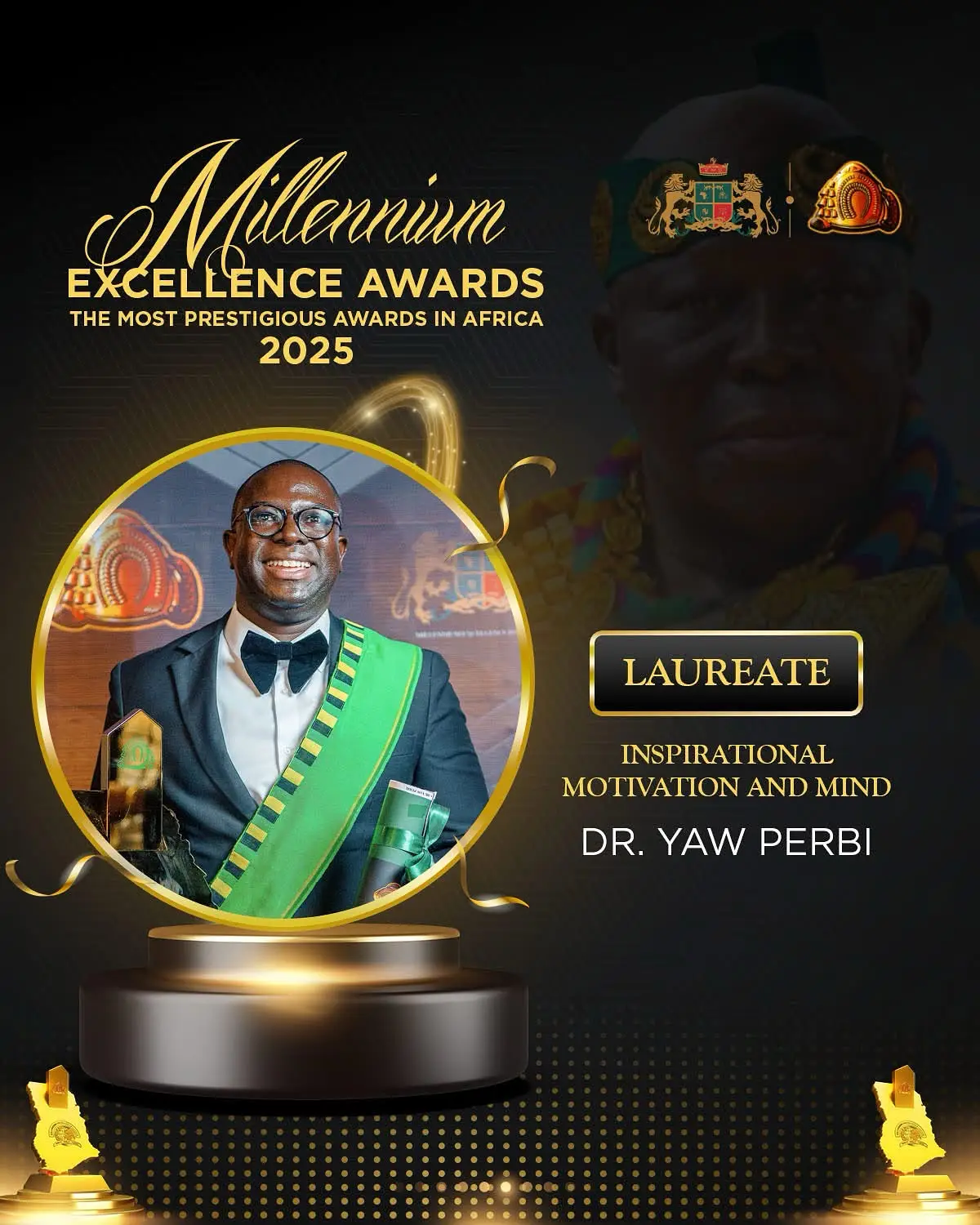
Millennium Excellence Award: Twice in Two Decades
When the Millennium Excellence Foundation (MEF) notified me about the nomination of ‘Dr. Yaw Perbi’ as a 2025 awardee in the ‘Inspirational, Motivation & Mind’ category, they requested a one-minute, sort-of ‘justification’ video. I’m reliably informed they were… let’s just say, not disappointed.
But I was quick to write back to remind them that I had had the honour of being an awardee before, nearly two decades prior (2006), thus this might be a tautologous oversight. That said award ceremony—the National Youth Excellence Awards—was barely a week after our August 12 wedding, at the University of Ghana’s Great Hall atop the Legon hill.
Of course the MEF had the records; after all this was a public matter, nay national, for the award presented to me by the then-Vice President of the Republic of Ghana, Alhaji Aliu Mahama, was the Highest Achievement Award, or Highest Award for Excellence, crowning all the various sectoral awards for sports, writing, entrepreneurship etc. The twenty-three other awardees cut across all then-ten regions of Ghana.
In the presence of several ministers of state, members of the diplomatic corps and other dignitaries, I received the topmost award–Highest Award for Excellence–for males and Abena Amoah (now Managing Director of the Ghana Stock Exchange) for females. We were featured in the national newspapers and other media. Ghana’s Minister of Health then, Major (Rtd.) Courage Quashigah, took it upon himself to drive all the way to the 37 Military Hospital, where I was serving as a house officer, to pay homage to my Commanding Officer and congratulate me. He put his admiration and hope together in a letter, dated September 28, 2006, a portion of which read:
“I write to personally congratulate you for being a recipient of the Highest Award for Excellence at the recent Newmont Ghana National Youth Achievers 2006 Awards… We in the health sector are very proud of you and urge you to continue to be an Outstanding Achiever… It is my hope that you will bring your charisma and devotion to bear on every youth you encounter and they in turn will emulate your leadership example. On behalf of the entire health sector and on my own behalf, please accept my congratulations.”
Despite all of that significance of that Highest Achievement Award back in 2006, the MEF was quick to remind me that that was a special #YOUTH awards edition, title-sponsored by Newmont Corporation Ghana. As part of their corporate social responsibility, they were bent on contributing to shaping talents in Ghana. Now, THIS—the 2025 Millennium Excellence Awards—was the real deal. For boys to men. And that the great Asante king himself, Otumfuo Nana Osei Tutu II, was not just party to but even patron of this ‘new and improved,’ and adult, edition.
To have twice received this most prestigious national recognition in two decades for just being what the Almighty made me to be and for merely doing what He’s commissioned me to do, with excellence, is my humblest honour.
O for more of my utmost for much more of His highest glory!
PS. You may view the one-minute impact video now on YouTube.
REFERENCES
Ghana News Agency (GNA). “We are committed to shaping talents in Ghana – Newmont.” See Ghana Web: https://mobile.ghanaweb.com/GhanaHomePage/business/We-are-committed-to-shaping-talents-in-Ghana-Newmont-109326
Abubakar, Razak Mardorgyz. “Ghana: Excellent Awards Foundation Honours Ghanaian Youth.” All Africa. See https://allafrica.com/stories/200608220578.html
Quashiga, Courage (Major Rtd.). Congratulatory Letter to Dr. Yaw Perbi dated September 28, 2006.

Of Birds, Green Pastures and Big Dreams
Had I known that my last conversation with Prof. Allison Howell (1951-2023) when I was briefly in Sydney, Australia in Q1 of 2023 would be my last, I bet I would’ve tried harder to see her in-person and not just be satisfied by our WhatsApp exchanges.
Receiving a copy of this ‘beauRiful’ compilation of her self-captured photos of approximately 30 different kinds of birds she sighted where she lived in Oyarifa (on the eastern outskirts of Accra, Ghana) has evoked all kinds of emotions. No, she was not a trained zoologist or ornithologist but her paradigm of creation care was fundamental, undergirding her formal training in Anthropology (Sydney), Environmental #Geography (Toronto) and Divinity (Edinburgh).
I was simultaneously sad and glad to be present at Allison’s funeral in Accra. She had requested to be flown back to Ghana, from Australia, to be buried among the people she served for 40 years, Ghanaians in general and the Kasena tribe of northern Ghana in particular.
These birds were largely attracted to and found in/around a green park in Kuottam Estates, Palm Valley, in Oyarifa which she had turned from a waste land, literally a rubbish dump, into an oasis of “rest and hope and peace.”
Earlier this week, I shared about last week’s Crystal Ball Africa panel conversations addressing “Are there green pastures at home?” Well, it seems it had to take an Australian to come all the way from ‘down under’ to show us one of such pastures. In Madam Howell’s own words, “…this area was just rubble and grass. People had thrown rubble, building waste and things like that into the area and I felt something better could be created.” Today, that lush green area with seats and swings and a little pond has been graciously named “Allison’s Greens” by the residents association. In fact, only two weekends ago it was the venue of a children’s party we dropped our nine-year old at.
It might interest you to note that although she was the transformer-in-chief, Allison never wanted her name on it! In fact, according to Alex Asiedu, a resident, “Allison came up with the idea of the park. Warm, resilient and self-effacing, she was able to convince the owners not to develop the strip of land on which it sits and did not give up until they gave in. Generous and humble, she single-handedly relieved the funds to develop it, and still resisted having her name on it. But the community, grateful for her foresight and generosity, would not have it any other way.” Yes, the learned prof lived for Soli Deo Gloria—God’s glory alone![]()
Back to the beginning, the ornithology. The beauRiful bird on the book cover is a Senegal Coucal (Centropus senegalensis). The one score and ten birds in the collection range from the greenish Rose-ringed Parakeet through the Purple Swamp Hen (Porphyrio porphyrio) and Green-backed Heron (Butorides striata) to the mainly yellow Little Bee Eater (Merops pusillus).
Don’t just seek greener pastures elsewhere, make some! Right where you are. You never know just who might flock there.
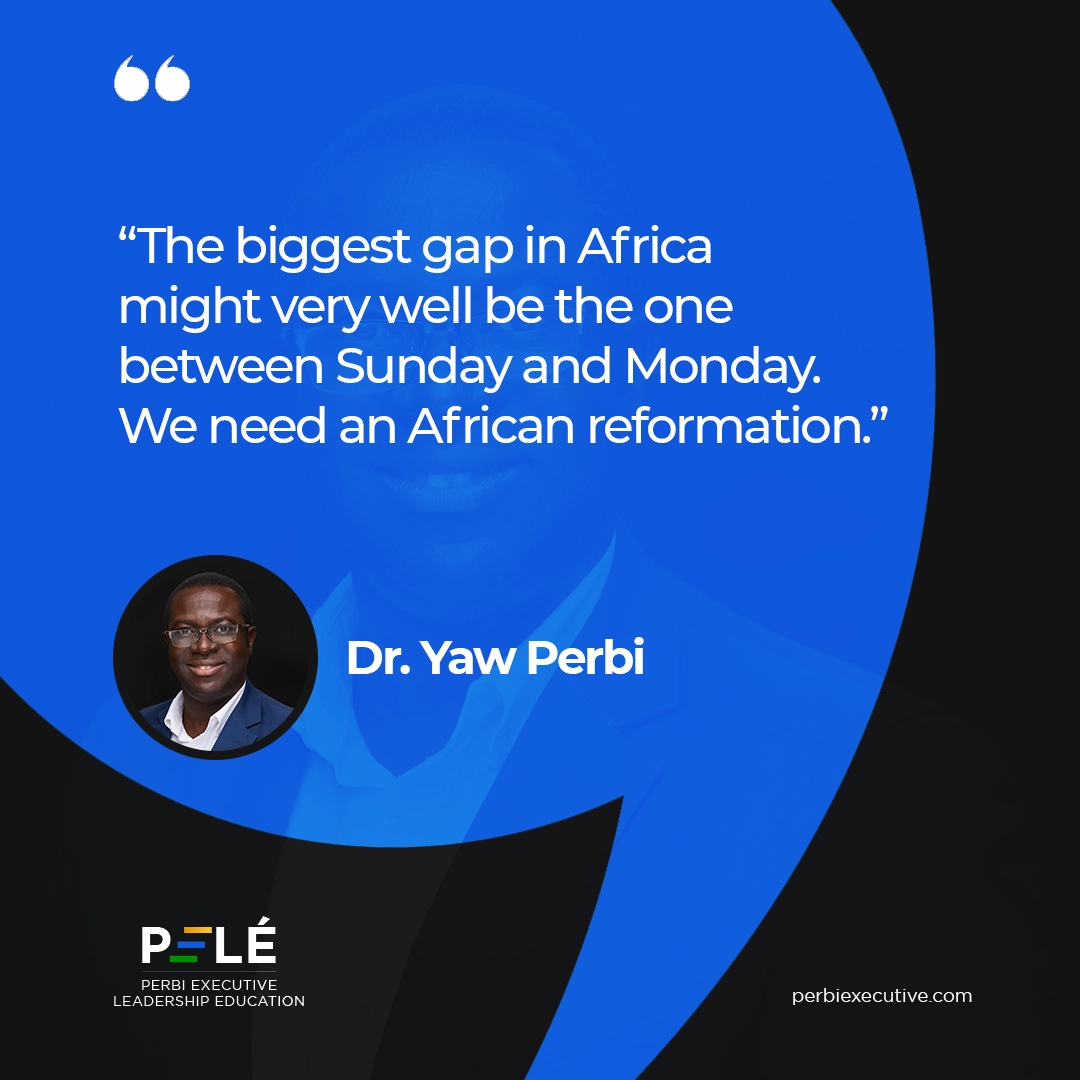
The Biggest Gap in Africa
Educated at Achimota School where one is taught “respect for all that is true and of lasting value in the old African culture, beliefs and ways of life,” even today I still mine for treasures that made ancient empires on the continent—from Asante to Zulu—greatly flourish. Thus I join the call for an African renaissance.
At the same time, considering how the modern world was greatly shaped by the 16th century Reformation such that places that ancient African and Asian empires considered ‘cultural backwaters’ suddenly rose, surpassed and even dominated dynasties, I seek an African reformation.
One of my favourite offshoots of the Reformation is how the new paradigm and value shifts precipitated (or at least catalysed) scientific inquiry and the Protestant work ethic. Some are of the opinion that the religious reformation and scientific revolution of that era were merely coincidental and not one of causation. I beg to differ—so do several academics.
The current meteoritic rise in African Christian faith, to the extent that since 2018 Africa has been the most numerically Christian continent in the world (Latin America is second, Europe is third), is impressive. However, this phenomenon that is only going to crescendo to the extent that by 2050 Africa will have more Christians than those next two continents combined, is mainly of the Pentecostal-Charismatic strain that has sign-seeking, miracle-performing and material-grabbing at its core, at least in practice.
The materialistic and consumption-based philosophy, also known as the Prosperity Gospel, as well as the wanton surrender of God-given human agency in exchange for divine miracles, signs and wonders are diametrically opposed to the Protestant paradigm. The Reformation-born Protestant work ethic attaches religious importance to labouring at one’s job and places a high value on productivity and frugality, viewing hard work and efficiency as an expression of one’s faith rather than as an excuse for the same.
When I see the throngs who celebrate faith on Sundays but don’t show it through their work in between Sundays, I lament about the huge disconnect. Don’t they know that their very Good Book is explicit that “faith without works is dead”? The biggest gap in Africa might very well be the one between Sunday and Monday.
May we receive much grace and sound training to close that looming lacuna in this new year. Otherwise not even the desperately-desired ‘24-hour economy’ which some, like the newly inaugurated government in Ghana (January 7, 2024), are touting can rescue us from our socioeconomic doldrums! We need an African renaissance and an African reformation for an African renewal this second quarter of the not-so-new-anymore millennium. Yes, 2025 begins a new quarter of the 2000-2099 millennium A.D. It’s about time. Mind the gap, Africa, mind the gap.

GOD KNOWS I like Dr. Mahamadu Bawumia (#DMB).
GOD KNOWS I like Dr. Mahamadu Bawumia (#DMB). A couple of weeks after he was sworn into office as Ghana’s Vice-President I called him and his wife “Muslim Ambassadors Extraordinaire” in an article that sought to help the Christian majority in Ghana particularly to appreciate that there isn’t only one kind of Muslim (see https://yawperbi.com/muslim-ambassadors-extraordinaire/). In the interest of disclosure, this was a lovely couple that were guests at my wedding over a decade prior and has gotten see again as a doctor at the 37 Military Hospital when they presented with a sick child a couple of years later. Adorable couple.
However, as a student of #leadership DMB’s initial moves as the #NPP’s presidential candidate this year sounded alarm bells for me. First, #leadership is #responsibility. Not willing or able to take responsibility for the economic doldrums his government—in which he is the head of the Economic Management Team—was bewildering. He blamed everyone including Corona, Russia and Ukraine but himself, and his government. That was bad.
What’s worse than this first shirking of responsibility, he belittled his high office—the second most powerful man in the country—by saying he was ‘only’ the “driver’s mate” (or bus conductor). Ah! Such an insult to leadership in general and the vice presidency in particular. Even those of us with no legitimate power of the people have made significant impact in our own small ways from our own small corners. How could a big man be so irresponsible?!
It has come to my notice that later Dr. Bawumia’s campaign tried to veer off the irresponsible and reprehensible ‘driver’s mate’ messaging but for people like me, it was too little too late.
And then the worst came: his choice of a right-hand man (literally on his right in this picture). That was a bad choice of an intemperate man, too highly inflammable for the second highest possible position of power in the land of our birth. And not long after being (mis)picked Dr. Matthew Opoku-Prempeh would prove my point about his ill-fit. In fact, on the very day he was outdoored he began his chain reaction of faux pas, daring to attack the founding president of our dear Republic. A national furore followed. So beyond the first red flag of not exhibiting basic responsibility as a leader, now he had added insult to injury by casting doubt about the quality of his decision-making by this choice of Veep.
When I was called to see Dr. Bawumia a couple of months ago, I flat out refused to honour the invitation. I like him (and his wife) but principles are principles; we must all have a True North and not just flow by the whims and caprices of others or directed by pocket economics.
Now that he has lost the election and has four years to reflect, regroup and rebound (if he still wants to and his party so endorses), I might be able to chip in my two cents as I did in the pre-2016 election and pre-2008 for his party.
I hope DMB will take full #responsibility this time—after what seems to be a trouncing of the incumbent, a ‘green tsunami’ of the opposition #NDC—and then we can leverage his other strong leadership attributes like being visionary and innovative. And to me, he comes across also as a humble servant-leader too.
These are by no means the only reasons DMB and the NPP lost—I have a laundry list of 29 items—but for me the faulty foundation of not taking #responsibility in the first place was his Waterloo.

AS WE GO VOTE By Jude Hama
Church leaders and members are to be engaged in National Politics by exercising their civic rights to vote. The National elections matters require proper ethical leadership response from Pastors and Church leaders; and indeed right conduct and behaviour from all church members and all
citizens. Heads of churches, Pastors and key Christian leaders would behave towards the key political candidates and political parties as “mother of twins”. A saying in our local culture goes like this: “A mother of twins lies in bed as truly a twin-mother: so as to give access to breast milk
to both babies”. She is to exercise her motherhood in a responsible and equitable way in relating to the twin babies. A glaring or consistently subtle leaning or support of a Head of church towards a Political Party and a key Political Party Candidate could send wrong signals of Partisan Politics
conduct into the Church Denomination and create divisions, mistrust; and strong disaffections from within the church. Church members in all Regions are discerning. They are all not likely to align themselves to only one political party. The integrity and ethical behavior of heads of
churches and Christian organizations in political matters is essential.
Church members may freely associate with any political party or political candidate and must also engage in even partisan political activity in a godly manner. As church members and people of God, our true godliness must be seen in our partisan political life and activities. Jesus must be
Lord over all aspects of our lives, including political conduct. Infact, a Ghanaian church leader gave the advice that as the Church becomes increasingly drawn by competing political interests and partisan political players, Heads of churches, Pastors, and key Christian leaders must ensure
their partisan politics should not get the church distracted from the sound and true worship of Jesus the Christ, our only Saviour and Redeemer God alone. Christian leaders must stick to following Jesus in a politically divided society. This is extremely important.
The most Rev. Dr. Paul Kwabena Boafo sent the following on National Elections and Ethical Leadership to the 2024 Synods of the Methodist Church Ghana across the country: “As a Church we continue to play our neutral role when it comes to National Politics. We pray for all who would present themselves as candidates to seek the mandate of the people to be elected. However, we ask all Methodist candidates to be men and women of integrity who will bring their discipleship to bear in their campaigns by avoiding the politics of insults and attacks on personalities. As people called Methodists, we understand that living the transformed and mature Christian life does not permit us to engage in any election malpractices. Let me remind us all of John Wesley’s advice on How to Vote in an Election: “I met those of our church who had votes in the upcoming election, and advised them:
-
1. To vote without fee or reward, for the person they judged most worthy.
2. To speak no evil of the person they voted against, and
3. To take care their spirits were not sharpened against those that voted on the other side.”
As we go vote, we urge you to be “Agents of Peace”. Be an “Agent of Peace”! go in the spirit of the Prayer of St. Francis: “Lord, make me an instrument of Your peace: Where there is hatred, let me sow love; where there is injury or hurt, pardon; where there is doubt, faith; where there is despair, hope; where there is darkness, light; and where there is sadness, joy. Amen.”
Rev. Dr. Bobby Harrington writes: “disciples or followers of Jesus should vote. Every disciple or follower of Jesus should vote, first and foremost, in a way that honours King Jesus”. It is our heritage as disciples or followers of Jesus to champion God’s Kingdom values which when absent will not make the people in the communities and the Nation function very well. These will include values like Truth; Humanity’s dignity and worth; care for the poor, lowly and marginalized; sound Biblical marriage and human sexuality values (no LGBTQ; no marital pairing that the Bible forbids); seeking justice (for justice and peace flow together); forgiveness, hope, and love. So decide how to vote according to God’s Kingdom values Jesus taught us which are essential for experiencing meaningful and abundant life at personal and home level as well as National level.
Professor Andrew Walls and Cathy Ross encourage the Church and church members to intentionally and persistently in all aspects of life to pursue the following five key mandates of the church:
-
a. “To proclaim the Good news of Jesus and His Kingdom”. To pursue effective
evangelization of all people groups in the nation, and the nations. (Matthew 28:18-20)
b. “To teach, Baptize and Nurture New believers”. To build up resilient matured Christ-like
persons.
c. “To respond to Human-need by loving service”. Believers are servants of a world in need,
d. “To seek to transform unjust structures of society”.
e. “To strive to safeguard the integrity of creation and sustain and renew the life of the
Earth”. Care for the environment.
These are the agenda of Jesus for the church, and Christ followers would vote for governance conditions that will facilitate the Church’s fulfillment of these agenda.
Jesus’ disciples or followers then would decide how to vote according to the values of Jesus Christ and His mandate to the Church.
And so the Bible urges Christ’s followers to pray for all people and key leaders of our communities, constituencies, and nation and “so that we can live peaceful and quiet lives marked by godliness and dignity. This is good and pleases God our Savior, who wants everyone to be saved and to understand the truth. (1 Timothy 2:2b-4 NLT).
So, go and prayerfully vote to honor God and to see what pleases Him achieved.
(The Author is a Consultant in Authentic Christian Spirituality and Discipleship and Former CEO of Scripture Union)
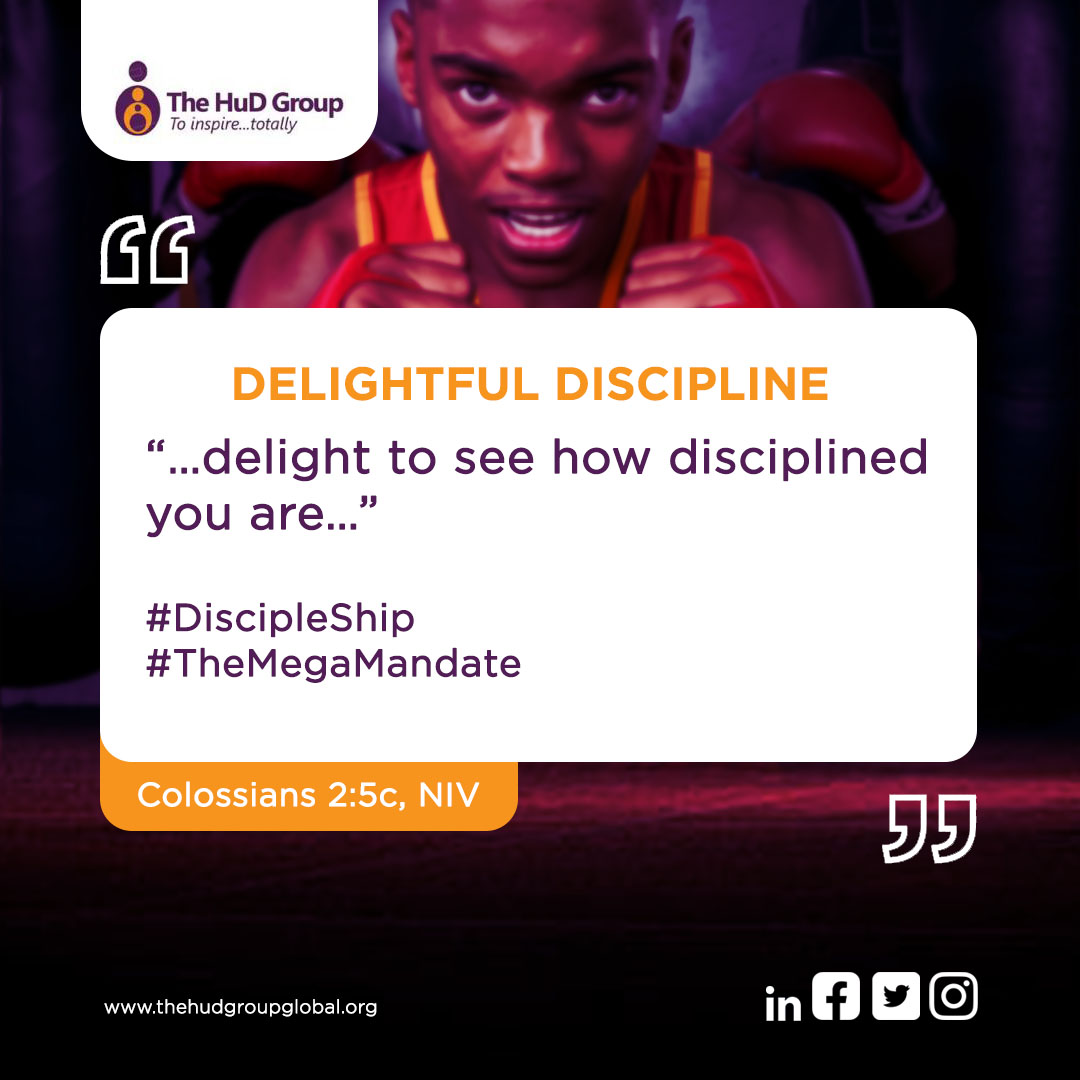
THE DELIGHT OF DISCIPLINE
If you hate discipline, you can neither be a good leader nor a good follower. Where does that leave one then? Lol!
Discipline is the practice of training oneself (or others) to obey rules (or a code of behaviour), to keep order(liness) and even punish to correct disobedience/disorder/disloyalty. While no human born of woman is 100% disciplined, there is a direct correlation between how disciplined one is and how successful they are. Deep, true and lasting success, that is.
There seems to have arisen an undisciplined crop of people, among Christ followers especially, who think God’s grace is a licence for disobedience and disorderliness. What they do not realize is that grace works better for disciplined people; just like those who leverage grace to work hard get miles ahead of the pack, a cut above the rest.
Part of the reason for throwing away discipline, it seems, is the notion that it impedes one’s freedom. The truth, however, is that indisciplined people aren’t free after all. They are slaves to whims and caprices, feelings, trends, social pressure and even the weather! “Only the disciplined are truly free. The undisciplined are slaves to moods, appetites and passions,” said Stephen R. Covey of blessed memory.
This Pauline scripture to his disciples in the old Turkish city of Colossae really caught my attention because in all of scripture, no one is more prolific in his writings and boasts in God’s grace than the lawyer-turned-preacher Paul. Yet he still saw the place of discipline and delighted that the Colossians were disciplined. In fact, to the quite unruly ones in the Greek city of Corinth he once penned, “Let all things be done decently and in order.”
Discipline provides the framework for fruitfulness; it is like the trellis that vines need to climb in order for grapes to fruit and remain. How on earth could one miss the obvious, that ‘discipline’ and ‘disciple’ have the same root. In fact, some, like Henri Nouwen, simply say “The word discipleship and the word discipline are the same word.” Consider discipline as “the effort to create some space in which God can act,” says Nouwen.
“I slept and I dreamt that life was joy. I awoke and I saw that life was duty. I worked–and behold, duty was joy” (Rabindranath Tagore). What is true of a disciplined life in general, as Tagore poignantly puts it, is true of the life of faith in particular. As Julius Coomson and I assert in our vital 2024 book, ‘Disciple Ship,’ “One cannot be a disciple of Jesus without discipline and disciplines” (p. 126). Sow discipline and reap development, dignity and delight.

